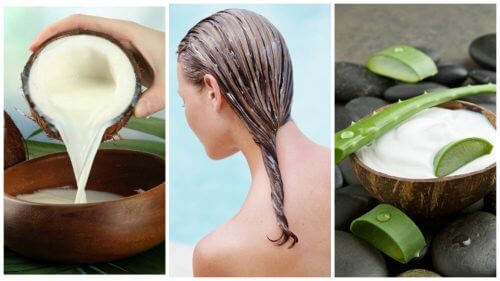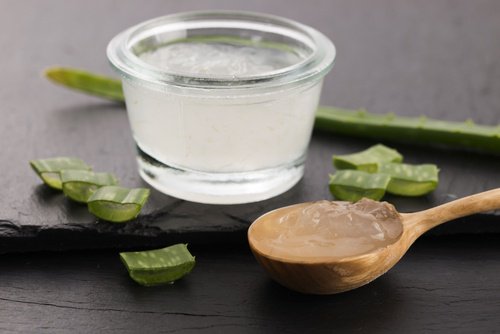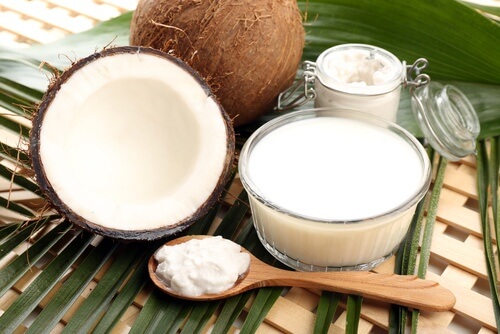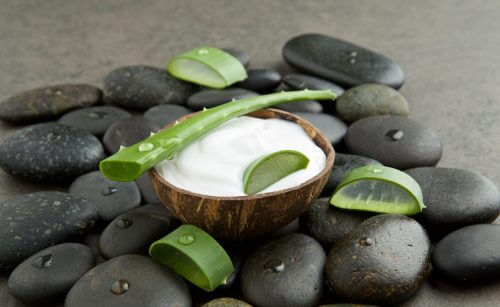Combat Excessive Hair Loss with this Milk Treatment

Excessive hair loss happens when there is a problem with your scalp and hair follicles. It may be a consequence of a nutritional deficiency. There are also factors that have to do with your genes, overuse of harsh chemicals, and exposure to toxins.
While it may seem normal to lose a few strands here and there, over time it can turn into a concerning problem. Fortunately, nature has provided us with a wide variety of ingredients with the ability to counteract hair loss. These suggestions will keep your locks full and strong.
Here, we’d like to share a treatment made with aloe vera and coconut milk, which will quickly get the issue under control if applied regularly.
Try it!
Homemade aloe vera and coconut milk treatment to combat excessive hair loss
This natural treatment made with aloe vera and coconut milk nourishes your hair from the roots to stop excessive hair loss in its tracks. It contains hydrating and nourishing compounds that work on your scalp to promote healthy new hair growth.
The combination of antioxidants, essential fatty acids, and vitamins with high biological value will mitigate the negative effects of free radicals on your skin while regulating its natural pH. It is also a great way to help with excessive dryness and breakage, two factors that directly affect hair loss.
Experiencing hair loss and not sure why? Read more:
10 Reasons that Might Explain Your Hair Loss
The benefits of aloe vera for your hair

Aloe vera is one of your best choices for taking care of your hair.
It’s not just healthier than the chemical products you get at the store. It also has large amounts of vitamins and minerals needed to strengthen your hair.
- Its gel contains more than 20 essential minerals that, once absorbed, help fortify weak hair.
- It also provides remarkable amounts of vitamins A, C, and B complex, all necessary for normal hair growth.
- Aloe vera contains a small amount of vitamin E as well, known the world over as an anti-aging element.
Applying it to your scalp will regulate excess oil production without interfering with the oil glands, giving a beautiful hydration and shine. In fact, because it’s also anti-fungal, it’s great at fighting dandruff and other infections of the scalp.
Benefits of coconut milk for your hair

This, together with its moisturizing action, makes it a very good treatment for relieving dry, fragile hair, and other problems related to hair loss. As if that weren’t enough, it stimulates the healing of cells and tissues. Thus, it strengthens your roots.
How to make this aloe vera and coconut milk treatment

Interested in making your own hair masks? Check out:
8 Moisturizing Hair Masks Made from Honey
While this treatment made with aloe vera and coconut milk is designed to help with extreme hair loss, it can also be used as an alternative to chemical conditioners and hair masks.
Its nutrients repair damage caused by environmental factors and heat, while forming a protective barrier against future damage.
Ingredients
- 5 tablespoons of aloe vera (75 g)
- 1/2 cup of coconut milk (125 ml)
Preparation
- Take the aloe vera gel and process it with the coconut milk in a blender.
- Blend for a few seconds until smooth and creamy.
How to apply
- Moisten your hair, separate it into a few pieces, and apply the mixture from the roots to the ends.
- Cover your hair completely and let sit between 30 and 40 minutes.
- After this time, wash with your regular shampoo and let dry naturally.
- Repeat 2 or 3 times a week to stop your bothersome hair loss in no time.
Are you ready to try it? If you like the recipe, try it at home and get a healthy, beautiful head of hair.
All cited sources were thoroughly reviewed by our team to ensure their quality, reliability, currency, and validity. The bibliography of this article was considered reliable and of academic or scientific accuracy.
- Klein, A. D., & Penneys, N. S. (1988). Aloe vera. Journal of the American Academy of Dermatology, 18(4), 714–720. https://doi.org/10.1016/S0190-9622(88)70095-X
- Hamman, J. H. (2008, August). Composition and applications of Aloe vera leaf gel. Molecules. https://doi.org/10.3390/molecules13081599
- Marina, A. M., Che Man, Y. B., & Amin, I. (2009, October). Virgin coconut oil: emerging functional food oil. Trends in Food Science and Technology. https://doi.org/10.1016/j.tifs.2009.06.003
- Eyres, L., Eyres, M. F., Chisholm, A., & Brown, R. C. (2016). Coconut oil consumption and cardiovascular risk factors in humans. Nutrition Reviews, 74(4), 267–280. https://doi.org/10.1093/nutrit/nuw002
- Bährle-Rapp, M., & Bährle-Rapp, M. (2010). coconut oil. In Springer Lexikon Kosmetik und Körperpflege (pp. 122–122). Springer Berlin Heidelberg. https://doi.org/10.1007/978-3-540-71095-0_2281
This text is provided for informational purposes only and does not replace consultation with a professional. If in doubt, consult your specialist.








